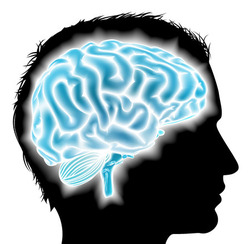One simple model posits two forms of intelligence that show up differently at different ages: "fluid" and "crystallized". Fluid intelligence is a capacity that manifests when a person demonstrates the ability to reason abstractly, see patterns, solve problems never encountered before. Creativity is related to fluid intelligence, as is the ability to think on one's feet. Crystallized intelligence is related to being set in one’s ways more (looked at negatively); it is also called accumulated knowledge. A wealth of knowledge is part of this type of intelligence as is metacognition, memories, wisdom, and disciplined thinking. When we think of a person as wise, we often mean they have crystallized intelligence.
Modern models and theories of intelligence are more complex than this, but the fluid-crystallized intelligence paradigm fits what we observe as people get older. The young have high fluid intelligence, and the old high crystallized intelligence. Psychologists think fluid intelligence peaks in a person's 20s while crystallized intelligence continues to increase until age 60 or so.
However intelligence is characterized, some aspects decline with age faster than others. Some aspects of intelliegence actually increase to the sixth decade of life.
National Institutes on Aging: Cognitive super agers defy typical age-related decline in brainpower
Do you get dumber as you get older?
In some ways, yes. Your brain slows down just as you can no longer run as fast as when you were young. For instance, vocabulary does not decline until very old age, but at an earlier age people often find themselves having to think about the word they want to use much more than when they are young.
A study published in 2005 found chess players peaked in ability at age 35, Another _study from 2011 found the best age was 31.4 years.
Psychologist Timothy Salthouse disagrees with those who think cognitive decline starts in old age or late middle age. He tested people at different ages in four areas: memory, reasoning, spatial orientation, and speed and found that performance in all areas declined through adult life. He says his findings "clearly establish the existence of cross-sectional age-related declines for many cognitive variables prior to age 60." Further, he notes a "nearly linear decline from early adulthood on measures representing efficiency or effectiveness of [brain] processing".
 Scientists agree there is considerable inter-individual and intra-individual variability when it comes to the effect of aging on intelligence. Older people are a heterogenous bunch - much more than young people.
Scientists agree there is considerable inter-individual and intra-individual variability when it comes to the effect of aging on intelligence. Older people are a heterogenous bunch - much more than young people.
What causes cognitive decline as we age? What causes dementia? Nobody knows the answer to those questions, but scientists have found that accumulation of protein plaques in the brain is associated with dementia, and possibly general cognitive decline. The two proteins - tau and amyloid - both become involved in structures called tangles and plaques. The actual causal mechanism involving these proteins, if there is one, is unknown. More on loss of protein homeostasis.
Cognitive change is a normal process of aging. There are maintenance of skills and knowledge acquired through life experiences with advancing age that remain stable. These cognitive abilities, such as vocabulary and language, have been found to be resilient to brain aging and can even improve with age. Other cognitive processes, such as long-term memory, attention, and speed of processing, decline gradually across the life span. Research has found that there are many individual differences among older adults in the rate of change in some abilities. The new discipline of cognitive neuroscience of aging has the opportunity to lend new insights and ideas for theories of aging over the next decade.
Unfortunately the lower the intelligence level, the higher a person's risk for death. Interpretation of the cognition-mortality relationship: health self-care is analogous to a complex job in that it requires a variety of cognitive abilities such as knowledge, problem solving, planning, and decision making.
Most people feel there are different kinds of intelligence even if there is no universal agreement on what those types are. Psychologist Howard Gartner famously proposed eight types: musical, logical-mathematical, verbal, body, intrapersonal, interpersonal, spatial, and existential. Gartner later added other potential intelligences and other thinkers have also added ideas.
Different types of intelligence peak at different points in a person's life. The peaks are not the same from person to person, but we can draw generalizations. Fluid intelligence peaks around age 20, although some elements of it peak later. Short-term memory seems to peak around age 25.
Both bodily strength and intelligence tend to be higher when you are young. Muscle strength peaks in the mid 20s. Studies have shown competitive swimmers peak at age 20 on average and track and field athletes at age 26. One, perhaps overly simple, model has both physical and mental decline as exponential.
Performance on tasks does not necessarily predict performance in everyday functioning. Mevertheless, researchers use tests like these to assess cognitive ability.
| Area | Test Used to Assess |
| Sustained attention | Connors Continuous Performance Test |
| Selective attention | Stroop Test |
| Language | Token Test, Category Fluency Test, Boston Diagnostic Aphasia Examination |
| Speed of processing | Pattern Comparison Processing Speed Test |
| Working memory | List Sorting Test |
| Semantic memory | Boston Naming Test, Category Fluency Test |
| Executive function | Trail Making Test, Wisconsin Card Sorting Test |
| Spatial ability | Mental Rotations Test, Paper Folding Test |
Mini-Mental State Exam - Test Your Memory - https://www.ncbi.nlm.nih.gov/pubmed/21845600
